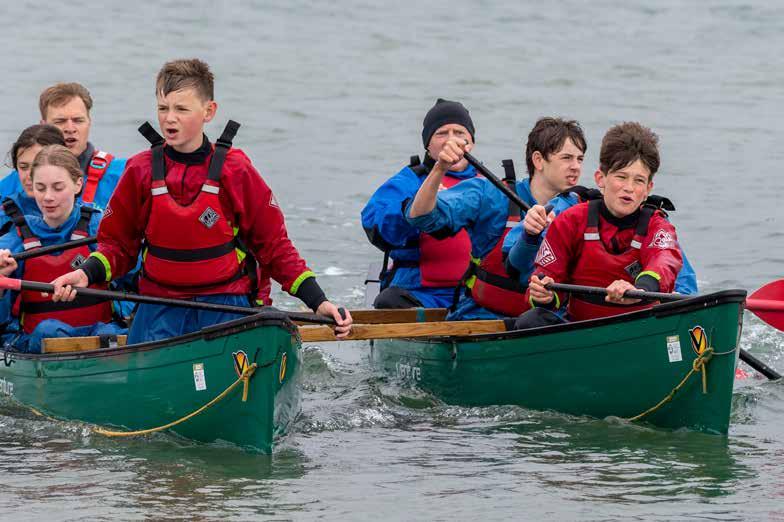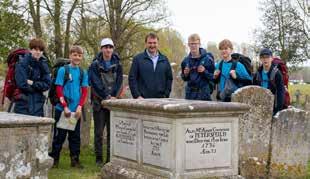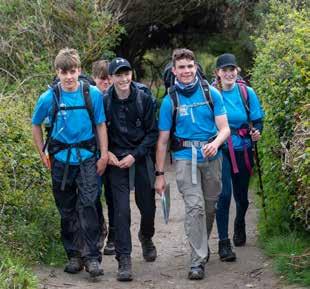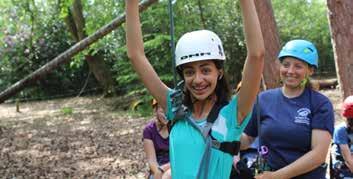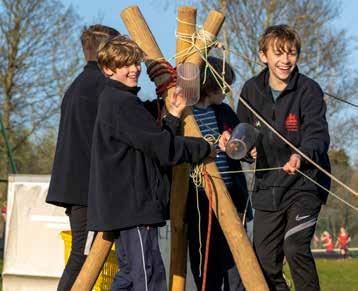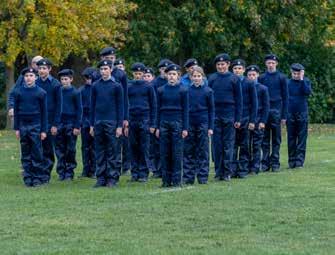
12 minute read
Adventure
CCF: Army
The Autumn Term started almost normally, with basic and advanced drill being taught to the Third and Fourth Years respectively, ahead of a socially distant, year group-bubbled Remembrance Parade. The new Third Years were then introduced to fieldcraft on Exercise Chameleon at Bramley Common, where cadets practised not being seen, using camouflage and concealment, tactical movement and the two-man field shelter. Exercise Sharpshooter allowed the Fifth Year cadets to hone and test their weapons handling skills, live firing the L98A2 cadet rifle on the Moody Down range in Winchester.
During the Spring lockdown, Tuesday evening training continued remotely, delivered by officers and our Sixth Form NCOs through Teams.
Despite Covid, the 11 Brigade Cadet Training Team has managed to run courses over the Autumn and Spring Terms. 14 Fifth Year and Lower Sixth cadets completed the SCIC (Senior Cadet Instructor Cadre), gaining promotion to sergeant and three Upper Sixth cadets passed the prestigious Master Cadet assessment.
The return to face-to-face training in the Summer Term saw the Third Years practising navigation and patrolling using the school site and farmland to east of Penn’s Place, the Fourth Years completing the Skill at Arms syllabus and the Fifth Years experiencing TIBUA (Training in Built Up Areas) in the corridors around the gym.
Lt Gibbins introduced clay pigeon shooting to the programme and the Parents Association kindly funded the acquisition of a second clay launcher.
June’s Exercise Night Owl allowed the Third Year cadets to practise and demonstrate their field admin and patrolling skills - living, eating and operating out of a patrol harbour. In the final week of term, the Fourth Years participated in Exercise Striking Tiger, a two-stand blank firing exercise using the L98A2 rifle at Longmoor. Cadets cleared a Close Quarter Battle (CQB) lane practising their pairs/fire/manoeuvre drills and set and executed a planned ambush. Lower Sixth NCOs provided the enemy force.
Capt David Nighy
Army Summer Camp
Covid restrictions regrettably made the camp non-residential this year, but the training team excelled themselves with the delivery of a very full, highquality programme at Longmoor.
Day 1 was a fieldcraft day, starting with a paintball section attack and defence, with NCOs leading and directing their sections using quick battle orders. Then on to TIBUA, executing a room-by-room house clearance. The afternoon started with an escape room challenge, set in 1917, with constituent PWRR regiment teams competing to solve a succession of problems to find and deliver orders to Piccadilly Circus. The day finished with a STEM challenge, with the four teams competing to build and fire catapults.
Day 2 focused on Survival Skills: tracking - reading the signs and building the narrative, fire lighting without matches, obtaining water and making it drinkable, trapping prey (mangle, tangle, strangle or dangle!) and building shelters using naturally available materials.
Day 3 was our AT (Adventurous Training) day, where the cadets took part in a variety of wet and dry activities, raft building and racing, kayaking and paddle-boarding, archery, climbing and mountain biking. Day 4 found our cadets on the ranges – firing the L98A2 cadet rifle on the ETR (electronic target range) and clay pigeon shooting.
CCF: Navy
As the world ground to a halt with the outbreak of the pandemic, so too did the opportunities for us to get together as a proud Naval section. However, we did not lie dormant, and our Senior cadet team of Josiah Wilson, Mathew Wagstaff, Mark Childs, Jared Lucraft and Henry Tasker were hugely instrumental in supporting and driving our section with their online Tuesday evening Teams sessions. While not compulsory, the majority of cadets signed in, recognising the value of the weekly sessions.
Towards the back end of the year, as Covid restrictions eased, we did manage to get together in our bubbles and although it did not feel ‘normal’ we were, at least, together again. Being able to parade, albeit in separate bubbles, and to implement some of the Naval programme for the cadets were of huge benefit and value to all that attended.
One of our major highlights was a day at Queen Elizabeth Country Park, orienteering and mountain biking. This was a wonderful day for the cadets to enjoy some freedom and fun and made up for the disappointment of not having any of the usual assets available to us from Naval command.
Lt Rob Maier
CCF: RAF
This year has been a tough one for the RAF section, as it has been for many. The lack of flying has been a big blow to the section as it is a major part of what attracts cadets to the RAF section, so not being able to provide that has been a challenge. However, we have been able to do a great deal of virtual flying on the brand new simulators, with the cadets learning how to do basic circuits around an airfield. The simulators have also given the cadets the opportunity to get to grips with the flight controls of an aircraft, which will be helpful when they finally do go flying. The CCF as a whole did very well with the annual Remembrance Service. While cadets were not able to parade in Petersfield, the CCF performed exceptionally at the school’s own service, even with the restrictions. It has been a privilege to be the Leading Cadet for the last year, and I hope that this year the cadets are able to get back to some more hands-on experiences.
Jasper Browne, Senior Contingent Cadet
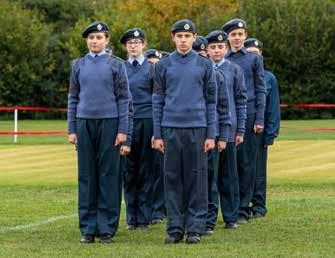
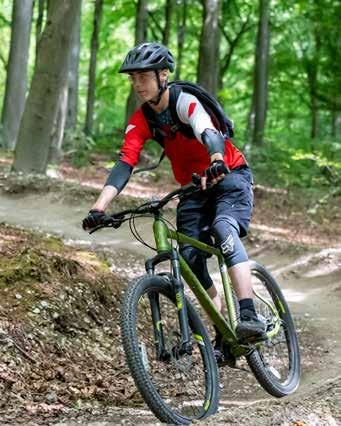
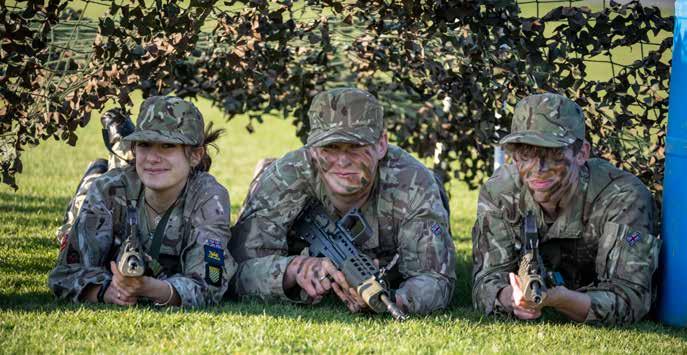
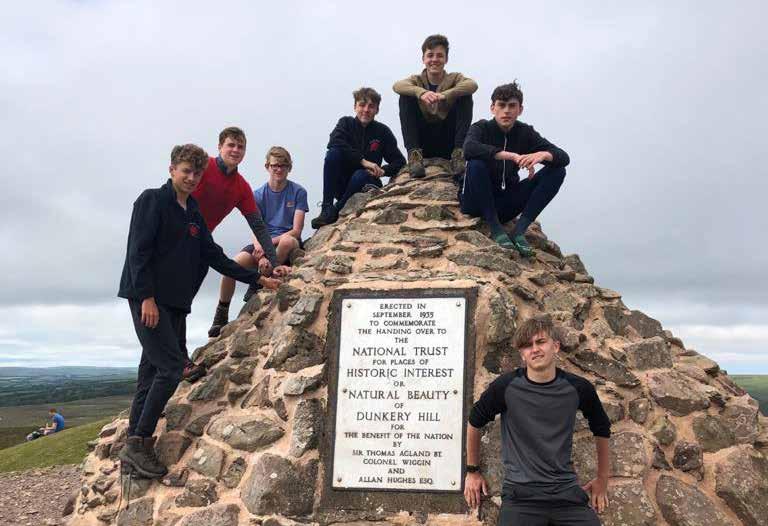
DofE
Unfortunately, Covid guidelines restricted the overnight element of DofE expeditions, as well as setting new challenges with planning and organisation. However, our Adventurous Activities team never shy away from a challenge and have rescheduled expeditions lost earlier in the year and also added in this year’s cycle, too.
In October, the Bronze assessed expeditions took place over two weekends with 117 pupils participating. Hiking in the South Downs, across Hampshire and West Sussex, 16 teams of pupils travelled independently over the two days, following their own planned routes via checkpoints where assessors met and evaluated their skills and progress.
Silver medallists had a busy Summer, with practice in the New Forest comprising a 3-day expedition learning and developing their campcraft skills. Sunshine and hills in beautiful Exmoor provided the fantastic setting for our 57 Fifth Year pupils completing their final expedition. Although Exmoor is not a mountainous area, with a full pack the hills and moorland set a real challenge for our youngsters and the high temperatures of June added a further dimension to the challenge. Whilst the sunshine brought the reward of phenomenal views, high temperatures made for some very demanding conditions where hydration and skin protection became top priority. However, smiles and success hopefully lead these youngsters nicely on to their Gold Award in Sixth Form.
Blessed with further extraordinary weather, the leavers of 2021 had a fantastic experience in our glorious Lake District National Park for their final Gold expedition. Scaling mountains of over 3,000 feet and long days including wild camps and stunning ridge walks, this was a special way for our eldest pupils to complete their DofE journey with Churcher’s College. Four days and three nights being completely selfsufficient is a great achievement and, with treasured memories and increased confidence, our intrepid students leave Churcher’s with not just their Gold Award completed but also the skill set, determination, initiative, independence and desire to keep adventuring and exploring.
Devizes to Westminster
Despite the impact of Covid, K2 endurance paddling and the DW programme has remained as popular and busy as ever. This year, we began with 55 paddlers from the Lower Sixth, an impressive third of the year group; to enable them all to take part we ran double sessions every Sunday in the Autumn Term. While this really stretched our resources to the limit, the sessions were great fun and very rewarding.
In addition to the Sunday training paddles, many of the squad were circuit training on the school fields on Tuesday lunchtimes and also frequently practising technique on the kayak ergos at lunch breaks or in free periods. Thus, the Spring Term lockdown and the subsequent cancellation of the 2021 race came as a huge disappointment.
Not to be deterred, as soon as restrictions allowed, we were able to devise an alternative challenge for the
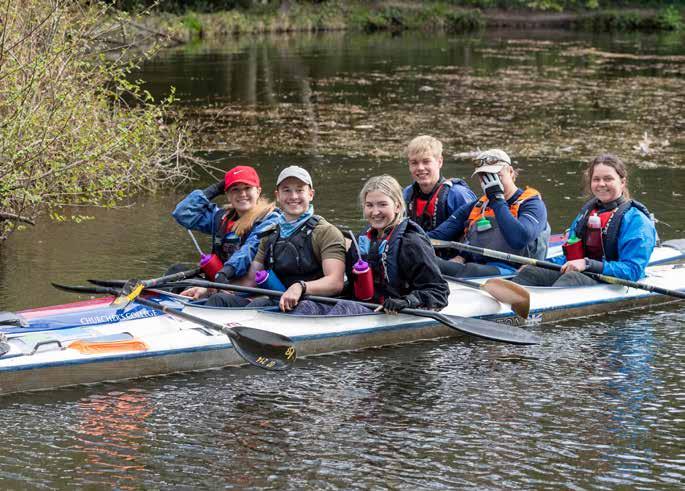
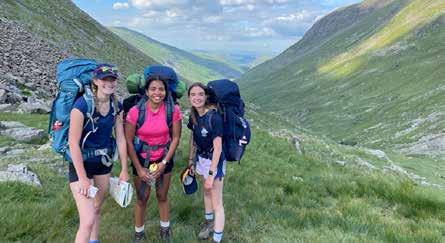
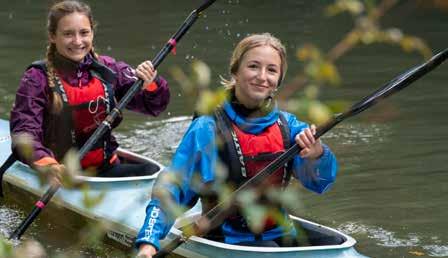
pupils to give them the opportunity to stretch themselves in some sort of event and put all their hard training to good effect. We devised the BCK250 Challenge which, in essence, was to paddle the entire length of the Basingstoke Canal (50km), with 30 portages, in one journey. Training sessions were a tough jump up in hours and kms paddled but on Sunday 2 May, 25 paddlers chose to take on the challenge. Supported by their parents and a team of staff, we saw the entire fleet complete the challenge and rightly feel very proud of their achievements. It was not the DW race that they had signed up for, back in September 2020, but it was nonetheless a superb challenge, proving their endurance, skills, resilience and teamwork and an achievement they will no doubt remember for a long time.
Mr A Rowley
OSCA
Lockdown and ongoing restrictions gave us much to overcome, but in line with the OSCA ethos we were determined to do all we could to keep the programme running. With some very creative thinking and planning we have been delighted to be able to reschedule and run all our evening OSCA challenge sessions for the 122 pupils who take part in the programme across the year.
As always, OSCA sessions and learning have been filled with fun and learning as Oscaneers have built and raced chariots, survived a tsunami, catapulted their way up the leader board, rock climbed, lit fires without matches and cooked their dinner, orienteered, pitched tents, learned first aid, worked with knives to make useful campfire gadgets to cook on, route planned and so much more. In addition, Scuba diving introductory sessions took place in the Summer Term, as did our three watercraft days on the sea down in Chichester Harbour where canoe adventures were a firm favourite.
With only four days’ notice, due to changes to Covid restrictions in Wales, we had to reorganise the whole OSCA residential programme from Brecon to English destinations. We were delighted to be able to solve the challenge and took all 122 pupils away on an OSCA 3-day residential adventure. Across the week pupils were able to enjoy a wide range of activities including rock climbing, abseiling, high ropes courses, canoe, kayak, paddle board, giant paddle boards, giant canoes, forest foraging, campfire lighting and skills, hikes, team building challenges, archery, raft building and raft racing and of course the great adventure of being away from home with their friends for three days.
We can proudly say that the 122 pupils in the OSCA gang of 2020-21 have had an amazing experience and move onwards with a fantastic range of outdoor skills and experiences which we hope will encourage them to continue to search for opportunities, both through our many and varied school programmes and in their own time outside school and to embrace and enjoy the wonders, beauty and fun of our amazing outdoor environment.
Mr J Lucraft
Ten Tors
In November, students in the Fourth Year and Lower Sixth started training to take part in the gruelling ‘Ten Tors 2021’, 35-mile and 45-mile challenges held annually in Dartmoor. Teams were formed and training started with a six-hour hike in daylight, dusk and dark in the South Downs area. When the country went in to lockdown, students were tasked with continuing to train in their own time and in their local areas, and to record their training using Strava, sharing their achievements with the leaders.
It therefore came as a great disappointment to be told that the challenge had been cancelled for the second year. However, inspired by Old Churcherians Will Duke and Adam Childs, who had been hiking extensively during lockdown and creating their own routes, a new challenge emerged.
The pair had created a route between Churcher’s Senior School and Funtington Churchyard, the location of Richard Churcher’s grave. This route was extended to reach the coast at East Head, and so the “Ten Tors Team College-to-Coast Challenge” was created. A 45-mile (72km) route with 1034m ascent for the Lower Sixth, and a 35-mile (56km) route with 810m ascent for the Fourth Year students.
A total of 27 students signed up to take part and after some group training hikes in April they were ready to start the two-day challenge. On Saturday 8 May they set off from College shortly after 8am. The 35-mile teams headed south and hiked through Buriton, West Marden, Stoughton, and Kingley Vale to reach the Funtington churchyard. The 45-mile teams headed east towards Durford and Woolbeding before turning south to go through Bepton and over the South Downs to Stoughton, Kingley Vale and Funtington Churchyard.
The teams reached Funtington Churchyard by late afternoon and, after a quick chat with Mr Williams and Mrs Dixon and some blister treatment, they continued on their set route. Unfortunately, due to ongoing restrictions, the teams were unable to camp and had to return home in the evening, so the following day they were driven to their Saturday finish points, to set off again on their routes. They hiked via Chichester, Hunston and Itchenor to finish victoriously at East Head (West Wittering) on Sunday afternoon where they were met with a wall of admiration and pride by parents, staff and friends!
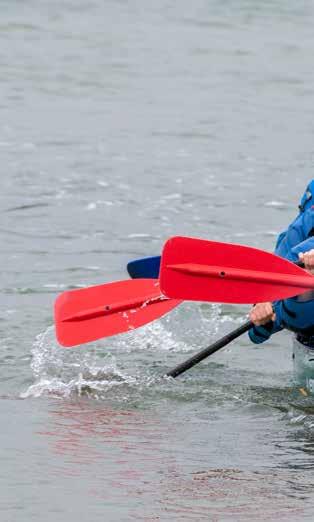
Mr A Rowley
